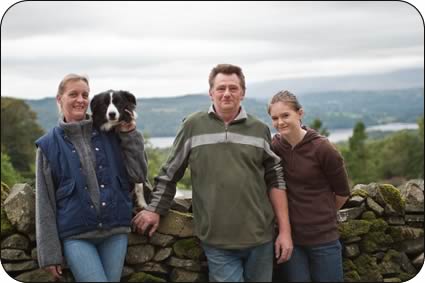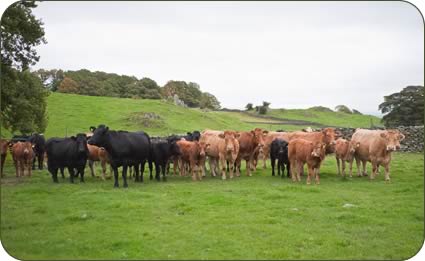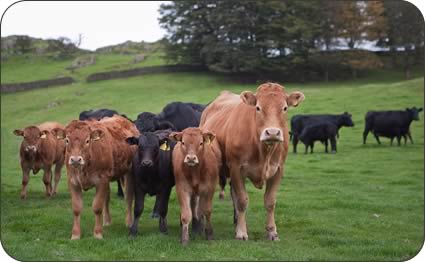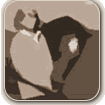Jennifer MacKenzie is an agricultural photo journalist with almost 30 year's experience. Operating from her base in Cumbria, Jennifer undertakes mainly industry-related freelance writing and photography.
Lake District suckled calves top the market
A typical Lake District marginal farm produces premium quality suckled
calves which regularly top the market.
A combination of breeding and a six month period of consistent feeding help Alan Clark, his partner Sarah Johnson and their 14 year old daughter Kimberley to meet their goals at Far Orrest, near Windermere.
 |
| Sarah, Alan and Kimberley at Far Orrest |
The partnership took on the farm two years ago following the untimely death of Alan’s father, Clifford, and the focus is on the 60-cow suckler herd of mainly home-bred Limousin cross cows.
Whilst still at school Kimberley ‘lives for her cows’ and does most of the winter feeding. The family get help at busy times from Alan’s nephew, Michael Salton.
The cows are put back to the pedigree Limousin bull with the three-quarter calves born in April and May. Bull calves and heifers are sold at 10 months old along with the heifers that are not kept for replacements, selling at 14 to 18 months old. They sell 55-60 calves per year.
At the special spring sale at Kendal auction mart this year the bulls picked up top tickets and heifers peaked at more than £800 weighing 350-400kg a head. Top price was £910 for a 10 month old bull, £30 more than the 2009 leading price.
“Before Dad died we used to finish the calves, but I have decided that we can’t compete with the people who can grow their own barley,” said Alan, who farms 400 acres in the ESA at up to 900ft above sea level, of grass, sand and rock with seven month long winters.
“For me to make money out of them finished at 16 to 18 months old, as we did previously, they would have to sell for at least £1,150 a piece.
 |
| Limousin cross cows and calves |
The cows are calved outside when the grass is starting to grow and they are tightly stocked. The calves are creep fed from the second week of October, to give them the best possible chance of growth while they are still suckling their dams, until weaning during the first week of January.
“The calves are not fed any creep at grass but at housing in October they are introduced to Massey Feeds’ Beef 70/30 with Yea-Sacc, a 16 per cent protein concentrate nut which contains 30 per cent cereals,” said Alan.
“The yeast helps to grow the bugs in the rumen which in turn helps the calves break down the forage and keep the rumen pH right.
“We feed the concentrate ad-lib. because we believe it’s a lot healthier. They eat small amounts but more often and it prevents animals being bullied.
“The calves are still on their dams until January when they go onto straw instead of silage to keep any belly off them. The fibre from the straw fills them and the ad-lib. concentrate does the rest.
“Because we sell our males entire we know the finisher needs to buy calves which are doing well in order to meet the 16 month maximum slaughter age that certain supermarkets are now stipulating. It’s imperative that we get the bulls off to the best possible start and that the feed supply for our suckled calves is consistent.
“There’s nothing like the feeling of going to the auction with a pen of 20 cattle all looking like peas in a pod and then picking up a number of tickets from the one sale.
“We’re always trying to improve the cattle to get satisfaction out of the job - two thirds of the breeding is the bull,” added Alan.
 |
| Limousin cross cows and calves |
Not afraid to invest in a bull to put some shape and style into the calves, Alan and Sarah paid the joint top price of 3,600gns for the reserve supreme champion at the spring Skipton pedigree Limousin sale for Laverock Domino from John Richardson, Laverock Bridge, Kendal and he was put out to work straight away.
Domino is a son of the prolific Rocky, which has sired bulls to 22,000gns, out of Laverock Pearl, a high-class dam who also produced Laverock Nimrod, the 2000 Royal Show champion.
“The first bulls we were using were Dad’s choice and now we have picked up from him, investing in a stylish bull and then relying on the feeding to do the rest,” said Alan.
For as long as Alan can remember, the Clarks have bought feed from Massey Feeds. Working closely with the local area manager, Mike O’Sullivan, they gear the feeding around the silage analyses and fine tuning it according to the condition of the cattle. “The partnership works exceptionally well,” said Alan, “as Mike will sometimes pick up on things that we have overlooked as we see the animals on a daily basis.”
The three-quarter bred Limousins stand out at Kendal and Lancaster marts and they sell to regular buyers with the bulls usually destined for finishers on the east coast.
Store cattle are currently a good trade but Alan and Sarah still have the option of selling the cattle finished if the market changes.
The cows are kept on a low maintenance diet of silage over the winter, and if the silage quality is not good enough a liquid feed will also be offered.
Heifers are selected early as replacements and those kept to go to the bull are only fed a silage diet over the winter.
The family also lambs 400 ewes, which is the maximum they can carry, mostly North of England Mules and some Mashams, which are crossed with the pedigree Texel.
From Christmas the ewes are fed a balanced compound feed containing the right levels of vitamins and minerals. Then, six weeks before lambing outside at the end of March, they are fed a specialist concentrate which contains extra vitamin E and chelated zinc to ensure a high health status before and after lambing.
The lambs are sold from mid-August off grass with some creep feed through to the following February through Kendal and Lancaster marts weighing between 40-43kg.

